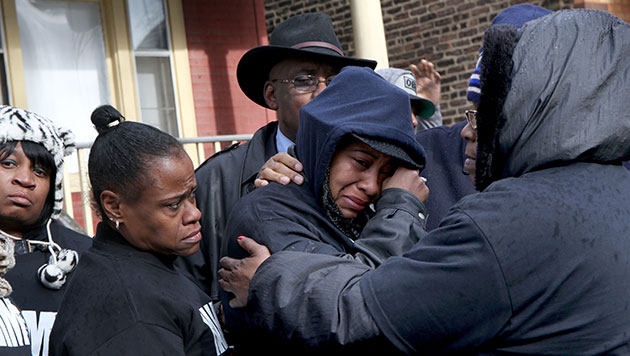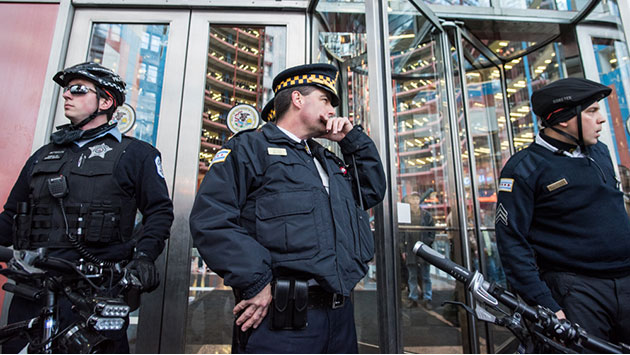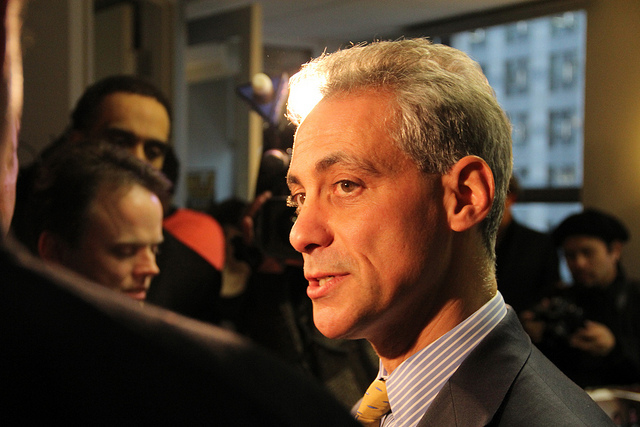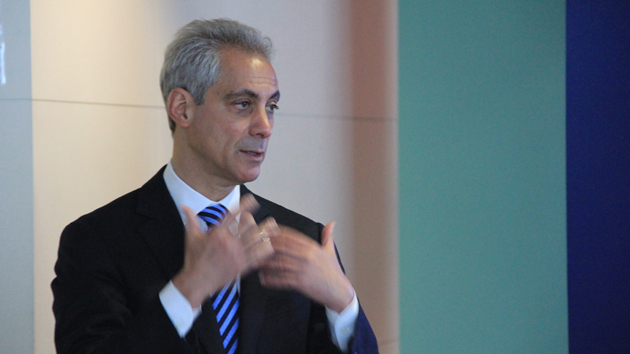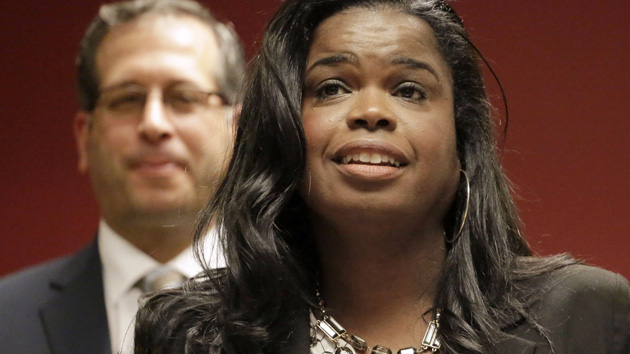
M. Spencer Green/AP
Could a bungled police shooting case be the undoing of Chicago’s top prosecutor? Her former subordinate is betting on it.
Kim Foxx, who once worked as an assistant state’s attorney under Cook County State’s Attorney Anita Alvarez, has emerged as her ex-boss’ top Democratic challenger in the March 15 primary. If Foxx prevails, it would be the first time since the Black Lives Matter movement began that voters rejected a prosecutor under fire for her handling of a case against the police—although the outcry over officer-involved shootings has changed the political landscape in a number of US communities. (See the box at right.)
Alvarez, who is seeking her third term as chief prosecutor, waited more than 400 days to file charges in the 2014 shooting of 17-year-old Laquan McDonald by a Chicago police officer. The incident—which the New York Times editorial board, among others, deemed an execution—only made national news this past November, when the city released video footage of Officer Jason Van Dyke shooting McDonald from behind and then unloading his service weapon into the prostrate youngster. Alvarez’s office reportedly had footage in hand within weeks of the shooting but held off charging Van Dyke, her critics point out, until after Mayor Rahm Emanuel was safely reelected. Alvarez has responded by saying she was waiting for the Department of Justice to conclude its own investigation of the shooting—and that she “won’t apologize” for conducting a thorough investigation.
As Alvarez struggles to get past the scandal, Foxx has been racking up key support. The Cook County Democratic Party endorsed her last month, after reconsidering its decision to stay neutral in the race. Several dozen county officials, city aldermen, and state and US representatives have publicly backed her as well—so, incidentally, has Alvarez’s former campaign co-chair.
Foxx’s personal background makes her, if not an unlikely candidate for the job, an atypical one. Her early years were spent living in the notorious Cabrini-Green housing project—she recalls ducking into a bathtub each Fourth of July to hide from the celebratory gunfire—and at age nine, she moved to Chicago’s middle-class North Side with her mother and brother. She twice was a victim of sexual abuse—once at the hands of a relative, she has said—and was homeless for a time in high school. She was introduced to the legal process while accompanying her mom to custody and child support hearings. (Her unmarried parents had two children together, and her father had claimed custody of her brother.)
At her mother’s insistence, Foxx attended Southern Illinois University, where she earned her undergraduate and law degrees. It is her childhood experiences, Foxx told me, that fuel her commitment to Chicago’s vulnerable communities. “I had a number of the risk factors that the kids who enter our adult prison system have,” she says. “So it’s deeply personal to me to be in a position to be an advocate for our criminal justice system where those people’s voices are at the table.”
Foxx spent nearly 12 years as an assistant state’s attorney, including five as a supervisor in the Juvenile Delinquency Division under Alvarez, where she oversaw about a dozen prosecutors in four courtrooms. Most recently, she was chief of staff to Cook County Board President Toni Preckwinkle. In that capacity, she managed the county’s nearly $4 billion budget and worked on legislation to reduce the number of kids automatically tried as adults. She also was the board chair for Planned Parenthood of Illinois, which under her leadership expanded access for low-income women by adding evening and weekend hours to its Chicago clinics. (Planned Parenthood Illinois Action—PPI’s political arm, has endorsed Foxx.)
Now, Foxx, who has been outspoken about Alvarez’s failures to hold the police accountable for abuses, is running on the promise of reform. She says she will reduce the jail population by diverting addicts, juveniles, and people whose low-level crimes stem from mental illness into treatment and community programs, and by cutting frivolous prosecutions of petty drug cases. She also hopes to streamline the felony review process to move cases through the system faster. This, she says, will free up resources to address the the county’s violent-crime problem—in January alone, 292 people were shot in Chicago, and 51 died. “It’s troubling to me that the homicide closure rate is 27 percent,” she told me. “If 70 percent of the people in our jails right now are there for nonviolent crime, and 30 percent are there for violence, we’re doing something wrong. It’s topsy-turvy.”
Repairing public trust, in both the police and the state’s attorney’s office, is key to correcting those numbers, Foxx says. “You’re not gong to be able to actively combat violence and the problems that have neighborhoods under siege if you are not doing it in partnership with the neighborhoods. You need the public as much as you need the police. It’s the public who we need to testify in court.”
Significantly, given the current distrust of City Hall, Foxx has set herself apart from the other Democratic contenders by supporting the appointment of a special prosecutor to handle police-involved shooting cases. But Foxx admits her hands may be tied when it comes to investigating the alleged abuses at the police department’s Homan Square facility, a scandal that rocked the city last year but was essentially buried. “The normal partner for you to investigate allegations of wrongdoing would be the Chicago Police Department, but it’s CPD doing it.” The Department of Justice, which is looking into the department’s practices, seems disinclined to investigate Homan Square, “so you’re hamstrung, because you need an outside agency to drive that.”
Although the McDonald scandal came to light after she entered the race, Foxx has been hammering Alvarez on it. “To suggest that this case was so highly complex that it takes 13 months [to charge], that is a false narrative. It is a lie,” she told Slate. As a former assistant prosecutor, Foxx went on, “I can tell you this was what we would consider to be a slam dunk…It took 13 months because they were waiting for the heat of Ferguson to die down.”
A local coalition of civil rights attorneys and community activists seems to agree. On Tuesday, they filed a petition in Cook County court calling for a judge to appoint a special prosecutor to take over the McDonald case and to investigate its handling by Alvarez’s office. The coalition claims Alvarez is too close with the police union to pursue the case fairly—the petition also calls for Alvarez to be banned from any future investigations of police misconduct in Cook County. (Alvarez’s campaign did not respond to written questions for this story.)
Foxx, meanwhile, will have to contend with suspicions that she was hand-groomed for her candidacy by county Board President Preckwinkle, who would therefore hold sway over her. Foxx says it’s not so: She was tackling criminal justice issues for more than a decade before meeting Preckwinkle, she told me.
In recent days, Foxx’s foes have opened a new line of attack reminiscent of Chris Christie’s attacks on Marco Rubio, questioning whether she has the trial chops to be the county’s top prosecutor. A Chicago Tribune Freedom of Information Act request for Foxx’s trial record (filed with her opponent’s office) turned up just two felony cases. Foxx clarifies that as an assistant state’s attorney she argued four felonies before a jury or bench and prosecuted hundreds more—most cases result in a guilty plea. In any case, trial experience isn’t the top prerequisite, she argues. “If you asked [Alvarez] how many cases she has done as state’s attorney, you’d be surprised: It’s two or three.” (Alvarez has said that in nearly 30 years as a prosecutor, eight of them as state’s attorney, she has argued about a dozen cases in court.)
“The crisis here in Cook County is not because [Alvarez] didn’t try a case,” Foxx adds. “It’s because she has not managed well.” But “if I needed to go to court and try a case, I would do it and do it well.”
In the latest Chicago Tribune poll, six weeks before the upcoming primary, Alvarez—who has near-universal local name recognition—led the lesser-known Foxx by 7 points. (Candidate Donna More ran a distant third.) But a quarter of likely voters were undecided. Alvarez also leads in fundraising. As of the end of 2015, her campaign had raised almost $700,000—nearly twice as much as Foxx. Yet Foxx is confident that she can close the gap. If she does manage to defeat the incumbent, she would still have to beat the GOP nominee in November. But that should be cake by comparison. Cook County hasn’t elected a Republican state’s attorney in 20 years.

